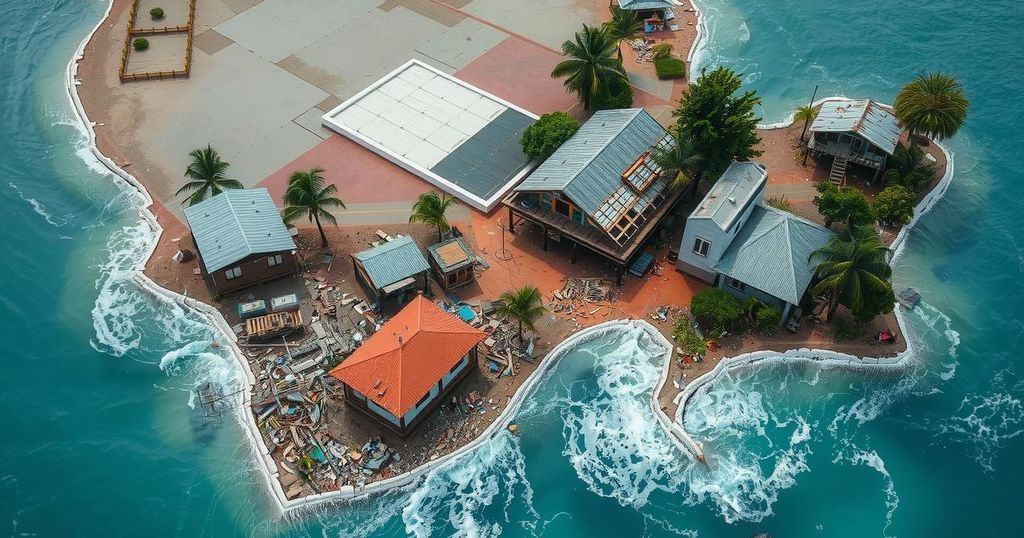World news
AFRICA, ATLANTIC OCEAN, CABO DELGADO, CHI, CHIURE, EMERGENCY RELIEF, EMERGENCY RESPONSE, INDIAN OCEAN, ISA, ISADORA ZONI, ISLAMIC STATE, MECUFI, MOZAMBIQUE, NATIONAL INSTITUTE FOR NATURAL DISASTERS, NATURAL DISASTER, NATURAL DISASTERS, UNITED NATIONS, UNITED NATIONS ’ REFUGEE AGENCY, UNITED NATIONS OFFICE FOR THE COORDINATION OF HUMANITARIAN AFFAIRS, ZONI
Oliver Grayson
0 Comments
Cyclone Chido’s Toll Rises to 75 in Mozambique Amid Ongoing Crisis
Cyclone Chido has resulted in a rising death toll of 75 in Mozambique, nearly doubling previous estimates. The cyclone impacted Cabo Delgado province, already affected by insurgent violence. The storm has caused widespread destruction, complicating humanitarian efforts as thousands remain displaced. The cyclone also signals potential future weather threats, exacerbated by climate change.
The death toll from Cyclone Chido’s devastation in Mozambique has tragically risen to 75, as reported by the government on Friday. This figure, nearly double the initial count, reflects the ongoing efforts of rescue workers who access remote areas previously cut off by the cyclone’s destruction. The storm struck the northern province of Cabo Delgado, a region already suffering from a prolonged insurgent conflict caused by a group affiliated with the Islamic State, forcing many to flee their homes and further complicating recovery efforts.
Reports from Mozambique’s National Institute for Natural Disasters indicate that at least 69 individuals were killed in Cabo Delgado, with over 740 injuries. As rescue teams navigated damaged dirt roads, they encountered widespread destruction, notably in the district of Mecufi, where many structures were obliterated. Isadora Zoni, a reporting officer from the United Nations refugee agency, described the scene as one of “utter destruction,” noting that “everything’s been flattened.”
Cyclone Chido has exacerbated the hardships faced by residents of one of the world’s poorest nations, particularly in areas already affected by climate change. Images shared by Ms. Zoni depict mud homes succumbed to flooding, wooden structures reduced to debris, and critical facilities such as health clinics suffering extensive damage. In the Chiure district alone, approximately 10,000 residents impacted by insurgent violence found themselves living in tents when the cyclone struck, compounding their distress.
As the cyclone traversed the southern Indian Ocean with winds reaching 115 miles per hour, it similarly impacted the French archipelago of Mayotte, where local authorities have confirmed at least 31 fatalities. The U.N. refugee agency warned that Cyclone Chido could herald a season marked by intense storms, reminiscent of previous years that have seen significant loss of life due to severe weather events in Mozambique. In recent years, the country has endured the wrath of tropical cyclones, which have forced nearly 140,000 individuals to abandon their homes due to extreme environmental conditions.
Cyclone Chido underscores the ongoing vulnerability of Mozambique to both climatic disasters and the lingering effects of internal conflict. The northern province of Cabo Delgado, where the cyclone made landfall, has been a hotspot for insurgent activities, leading to mass displacements. The country is annually subjected to storms originating from the southern Indian Ocean, with climate change exacerbating the intensity and frequency of such weather events. This history of cyclones, including Tropical Cyclone Freddy in 2022, highlights a persistent crisis where socio-economic challenges intertwine with environmental threats, creating a compounded crisis for affected populations.
In summary, Cyclone Chido’s devastating impact on Mozambique illustrates the dual challenges faced by communities grappling with both violent conflict and environmental catastrophes. As the death toll rises and recovery efforts proceed amid widespread destruction, the precarious situation of the affected populations is further strained by the realities of climate change. This situation calls for urgent humanitarian intervention and long-term strategies to enhance resilience in vulnerable regions.
Original Source: www.nytimes.com




Post Comment